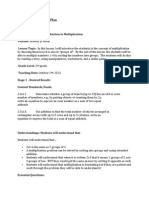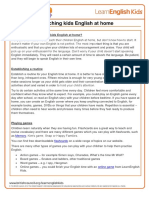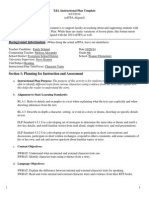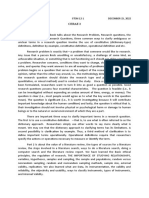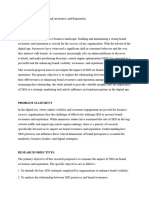Ib Lesson Plan 1
Ib Lesson Plan 1
Uploaded by
api-307965557Copyright:
Available Formats
Ib Lesson Plan 1
Ib Lesson Plan 1
Uploaded by
api-307965557Original Title
Copyright
Available Formats
Share this document
Did you find this document useful?
Is this content inappropriate?
Copyright:
Available Formats
Ib Lesson Plan 1
Ib Lesson Plan 1
Uploaded by
api-307965557Copyright:
Available Formats
Inquiry Based Lesson Plan
Teachers: Abbye Lopez
Subject: High School Government
Standard:
Strand 3: Concept 3 PO7, PO8, PO9
Concept 4 PO1 and PO4
ISTE Standard 1,4, and 5
Objective (Explicit): The students will analyze the different roles of the court by debating their groups side of the
case.
Evidence of Mastery (Measurable): The students will be presenting their research of the court case and understanding
of their roles in the form of role-play. We will be taking two days of class time to play out the case. Each student will
be playing as an active member of the court and presenting their case. Along with a 3 page summary that they will be
turning in to me, the students will be graded on their professionalism, understanding of the case, and properly acting
as their role.
Sub-objectives, SWBAT (Sequenced from basic to complex):
The students will be remembering the roles of the court system by identifying which role best suits their personality.
The students will understand the court case selected by summarizing it in the form of a paper.
Key vocabulary: Judge, Attorney, Jury, Defendant, Bailiff,
Accused, Bench Clerk, Plaintiff, Prosecutor, Informant, Guilty,
Innocent, Appeal
Materials/Technology Resources to be used: Ipads,
Google, Word, Outlines, Graphic Organizer, and
video camera because the role-play will be recorded.
Explore
Engage (Make content and learning relevant to real life and connect to student interest): After I as the teacher, have
explained the individuals roles of the court house the students will be deciding what role they would like to play. This
way the students are deciding for them selves what they believe to be the most interesting to them and what they
believe they can do the best job in. Then as a class they will come up with previous or current court cases. This also
gets them engaged because it will be cases that they believe to be important or that really stand out to them as
individuals. This assignment will be based off of what the students have decided for themselves and not just what I
assign them to.
Teacher Will: (explore questions, test students,
encourage analytical discussion) I will be answering
questions and sparking ideas in the students heads. I
will be asking them personality question to maybe
help them create the idea of what role they fit. I will
give examples of important/ historical court cases to
get them thinking about what they want to be
looking for
Student Will: (prioritize questions, group tasks,
gather data, create idea to move forward) This is
when the students will be asking themselves what
position they will do best in. They will be figuring
out who they are as a person and what fits their
personalities. The class as a whole will also be
creating questions to help them figure out what
cases is important. I will be facilitating them in
helping them decide what case would be better to
use.
Explain
Co-Teaching Strategy/Differentiation: Instead of assigning the students roles I will be helping them decide
for themselves what role they would like to be. If a student gets to pick what role they want it will create
more engagement because it will be something they chose to do instead of told to do. They will alos be
coming up with what case impacts them personally so this way they can have a connection to it. This way I
am teaching with them and not at them. They are the ones coming up with ideas and I will be assisting them
in the right direction. This strategy sparks individuality in my students and gets them feeling important and
connected to the project.
Teacher Will: ( compare ideas, contract
explanations, justify in terms of observations/data) I
will take their ideas and properly form them into
questions or evidence. I will help the students
organize their information in two different subjects
(nice to know and need to know). This is so that the
students are seeing what facts they NEED to present
during the role-play and also the facts they the can
through in if it comes up. I will be asking them
general questions to get their minds to think outside
of the box.
Student Will: (reporting, group discussion,
accessing information for concepts) This is when the
students will be noting facts about their case. They
will begin the acts of the role they have chosen.
They are now getting with their groups and finding
evidence to support the side or job they have
chosen. They are doing research on the case and
getting all the facts and figures in order to properly
role-play the case. They are conversing about what
points they should make during the role-play and
what information is the most important. They will
be using Google Docs to be able to work on one
single data sheet together in their groups.
Elaborate
Co-Teaching Strategy/Differentiation: My co-teaching strategy for the explain portion of this lesson will be
to help my students justify their research. I will not tell them what is correct or incorrect but instead help
them turn some of their research into factual statements that can play a part in their presentation. I will not
be assigning them things to say or prove this is all based on what they find important. I will only be placing
my input where it is needed.
Teacher Will: (apply concepts, explanations in new
context) I will be observing the class and be there to
make sure it all runs smoothly. I will be managing
the students to make sure they are role-playing I a
timely manner and assist the students when needed.
This is the time that me as the teacher gets to see
their research and understanding of the courthouse
system. I will be helping them apply all of their
research and information into a real life concept.
Student Will: (further practical work, videos,
debates, research) This is when we role-play. The
students will be running the classroom. It will be
their responsibility to act as a real life court. They
will be following all court rules and be presenting
their statements while being professional. They have
the opportunities to presents their case in any way
they want. With graphs, research, videos, or
whatever unique way they can think of.
Co-Teaching Strategy/Differentiation: The strategy for this section will be to be an observer of the students
knowledge. I am basically just a timekeeper in this case. I will be facilitating them and making sure they are
role-playing in a timely manner. I will not be running the show, they will. This is something that is very
different then what the students are used to. It is up to them to make sure they know how the court system
works and if they do not I will be able to see they do not have an understanding yet and I will step in to get
things flowing.
Evaluate: I will be evaluating the students on several different aspects during their debate/role-play. I will be observing
them on their professionalism. This includes them using appropriate language, dressed nicely, presentation, and
sticking to the role they have chosen. They will be evaluated on the content meaning they have a full understanding of
the court case and using academic sources and facts to prove their case. I will be paying close attention to
participation. Every student will need to speak during the role-play. This is so I can tell everyone has done their
research and everyone understands their role specifically.
You might also like
- Subject Link 2 Review Test 1Document4 pagesSubject Link 2 Review Test 1Ar KarNo ratings yet
- Multiplication UbdDocument9 pagesMultiplication Ubdapi-2528234060% (1)
- Marzano Form ADocument4 pagesMarzano Form AJeremy Williamson100% (2)
- Lesson Plan 1Document5 pagesLesson Plan 1api-491785165No ratings yet
- 1.introduction Mixed DevelopmentDocument3 pages1.introduction Mixed DevelopmentDgjj Compuiter100% (1)
- The Schapiro Group Research StudyDocument16 pagesThe Schapiro Group Research StudyThe Berlin Turnpike: A True Story of Human Trafficking in AmericaNo ratings yet
- BGCSE Art & Design SyllabusDocument23 pagesBGCSE Art & Design SyllabusgapeezeeNo ratings yet
- Subject Link 2 Review Test 4Document4 pagesSubject Link 2 Review Test 4Ar KarNo ratings yet
- Subject Link 2 Review Test 3Document4 pagesSubject Link 2 Review Test 3Ar KarNo ratings yet
- Classroom LanguageDocument14 pagesClassroom LanguageThanalechumee LechumeeNo ratings yet
- Classroom InstructionsDocument19 pagesClassroom InstructionsPushpaleella Sivaraj100% (1)
- Most Frequent Words and PhrasesDocument22 pagesMost Frequent Words and PhrasesDelfina AilanNo ratings yet
- Parents Articles How To Start Teaching Kids English at Home English PDFDocument3 pagesParents Articles How To Start Teaching Kids English at Home English PDFLina Roman LuzonNo ratings yet
- A Short Dictionary of Phrasal Verbs PDFDocument4 pagesA Short Dictionary of Phrasal Verbs PDFPilar Martinez Garcia0% (1)
- Useful Business English Meetings PhrasesDocument11 pagesUseful Business English Meetings Phrases814260No ratings yet
- Lesson Plan Template 2016 Ib Setting-Revised Curriculum 1Document4 pagesLesson Plan Template 2016 Ib Setting-Revised Curriculum 1api-292000448No ratings yet
- Surrender in The Integral Yoga-V1.1 - Usha PatelDocument165 pagesSurrender in The Integral Yoga-V1.1 - Usha PatelFrancisco de la BombardaNo ratings yet
- Subject Link 2 Review Test 2Document4 pagesSubject Link 2 Review Test 2Ar KarNo ratings yet
- Worksheet For Parts of SpeechDocument8 pagesWorksheet For Parts of SpeechMarissa Dominguez RamirezNo ratings yet
- Reading FluencyDocument3 pagesReading FluencyalexpascasioNo ratings yet
- Grammar SyllabusDocument4 pagesGrammar Syllabusapi-422035003No ratings yet
- Future TensesDocument22 pagesFuture TensesЮлія ГурмакNo ratings yet
- Focused Conversation 3 PDFDocument17 pagesFocused Conversation 3 PDFapi-309400338No ratings yet
- ABC's of HappinessDocument27 pagesABC's of HappinessMinalNo ratings yet
- Subject Verb Agreement VisualDocument5 pagesSubject Verb Agreement VisualSanjiv SadanaNo ratings yet
- Comprehension PassageDocument8 pagesComprehension PassageIva Sivaraja100% (1)
- Headway Intermediate Third Edition Unit 2 Lesson PlanDocument1 pageHeadway Intermediate Third Edition Unit 2 Lesson PlanMike Khokhlovych0% (1)
- 10 Black Dots Lesson PlanDocument3 pages10 Black Dots Lesson Planapi-237415788100% (1)
- OriginalDocument2 pagesOriginal王韻琦No ratings yet
- Use of articles-LECT-3Document33 pagesUse of articles-LECT-3Mohsin RazaNo ratings yet
- Lesson Plan 8Document7 pagesLesson Plan 8Allung SheinXyuNo ratings yet
- Classroom Phrases For Students in Different SituationsDocument8 pagesClassroom Phrases For Students in Different SituationsSyed XadaNo ratings yet
- Word Problems Grade 2Document8 pagesWord Problems Grade 2Sissy Meta SwilaNo ratings yet
- Lesson Plan 4Document5 pagesLesson Plan 4api-241840332100% (1)
- Using Verb TensesDocument5 pagesUsing Verb TensesklipordNo ratings yet
- Training Evaluation Form (English)Document2 pagesTraining Evaluation Form (English)versmajardoNo ratings yet
- Lesson 1Document4 pagesLesson 1api-393907178No ratings yet
- Delhi Public School, Greater Noida SESSION 2021-'22 Class Viii Cycle 2: Topic: Diary EntryDocument3 pagesDelhi Public School, Greater Noida SESSION 2021-'22 Class Viii Cycle 2: Topic: Diary EntryDev Sisodiya100% (1)
- Positive Thinking - DR - Manali LondheDocument16 pagesPositive Thinking - DR - Manali Londheprofpatil100% (2)
- Math Measurement-LessonplanDocument17 pagesMath Measurement-Lessonplanapi-300158509No ratings yet
- Classroom LanguageDocument46 pagesClassroom LanguageMarianVenancioJurado100% (1)
- Multiplying and Dividing DecimalsDocument4 pagesMultiplying and Dividing DecimalsSimon JobNo ratings yet
- 2nd Grade Math Measurement UnitDocument8 pages2nd Grade Math Measurement Unitcjcampbell08No ratings yet
- Irregular Negative Yes/No QuestionsDocument19 pagesIrregular Negative Yes/No QuestionsWagner Dorta100% (1)
- Verb Tenses Past Present FutureDocument5 pagesVerb Tenses Past Present FutureValeria J Iglesias CNo ratings yet
- KSSR WritingDocument23 pagesKSSR WritingAlexana Bi VieNo ratings yet
- Kindergarten Science Lesson WormsDocument3 pagesKindergarten Science Lesson Wormsapi-402679147100% (1)
- Diphthongs: Voice and AccentDocument34 pagesDiphthongs: Voice and AccentTariq Hayat100% (2)
- How To Improve Your Listening SkillsDocument0 pagesHow To Improve Your Listening Skillstreno3No ratings yet
- Fractions Decimals and Percents 1 1p59zelDocument45 pagesFractions Decimals and Percents 1 1p59zelyonesNo ratings yet
- Lesson Plan 1Document4 pagesLesson Plan 1api-283392025No ratings yet
- Pakistan International School Jeddah - English Section Lesson Plan (2 Term) - Junior SchoolDocument12 pagesPakistan International School Jeddah - English Section Lesson Plan (2 Term) - Junior SchoolSadia KhanNo ratings yet
- FCE Speaking TestDocument5 pagesFCE Speaking TestBondersNo ratings yet
- Telephone LanguageDocument5 pagesTelephone LanguageNitya K Nair100% (1)
- Peer Teach - ShapesDocument3 pagesPeer Teach - Shapesapi-381668561No ratings yet
- Thick and Thin Questions LessonDocument2 pagesThick and Thin Questions Lessonapi-340747462No ratings yet
- Science Lesson PlanDocument7 pagesScience Lesson Planapi-287183999No ratings yet
- Diversity Revised Lesson PlanDocument13 pagesDiversity Revised Lesson Planapi-267803909No ratings yet
- Eced 461 Unit Plan 1 3Document4 pagesEced 461 Unit Plan 1 3api-216125086No ratings yet
- Takaki Lesson Plan 3Document5 pagesTakaki Lesson Plan 3api-313960611No ratings yet
- Tasha Giles: WebsiteDocument1 pageTasha Giles: Websiteapi-395325861No ratings yet
- Assessment Terminology: A Glossary of Useful Terms: AccountabilityDocument8 pagesAssessment Terminology: A Glossary of Useful Terms: AccountabilityLawson SohNo ratings yet
- Final Complete AetasDocument30 pagesFinal Complete AetasRegie SalasNo ratings yet
- EDUC 201: " Research Methods With Intellectual Property": Julifred P. CadenasDocument18 pagesEDUC 201: " Research Methods With Intellectual Property": Julifred P. CadenasJesselly ValesNo ratings yet
- Designing A Five Star Hotel With The Approach ofDocument7 pagesDesigning A Five Star Hotel With The Approach ofmuncadamonicaNo ratings yet
- (For Audience) HTA 101 - Session 1 (02 Dec 2020) For Researchers and AcademeDocument98 pages(For Audience) HTA 101 - Session 1 (02 Dec 2020) For Researchers and AcademeJacklyn San GabrielNo ratings yet
- Kel 6 Edison Et Al 2012 Evaluation of Factors Influencing Adoption of Accounting Information SystemDocument17 pagesKel 6 Edison Et Al 2012 Evaluation of Factors Influencing Adoption of Accounting Information SystemPutri DelimaNo ratings yet
- Research Parenting Capacity PDFDocument73 pagesResearch Parenting Capacity PDFMaya MayaNo ratings yet
- Cerae 2-1Document3 pagesCerae 2-1asieee chimmyNo ratings yet
- Financial Analysis of Hero CyclesDocument106 pagesFinancial Analysis of Hero CyclesD Attitude Kid50% (12)
- The Impact of SEO On Brand Awareness and ReputationDocument11 pagesThe Impact of SEO On Brand Awareness and ReputationHassan RadwanNo ratings yet
- Servant Leadership, Employee Satisfaction, and OrganizationalDocument11 pagesServant Leadership, Employee Satisfaction, and OrganizationalArisCahyoPurnomoNo ratings yet
- Week 4 - Performance Task (12 & Abm 2)Document4 pagesWeek 4 - Performance Task (12 & Abm 2)Tresia Jean MilarNo ratings yet
- J of Business Logistics - 2021 - Richey - A Responsiveness View of Logistics and Supply Chain ManagementDocument30 pagesJ of Business Logistics - 2021 - Richey - A Responsiveness View of Logistics and Supply Chain Managementtaleenkhoury20No ratings yet
- SCDocument33 pagesSCKenan KoçakNo ratings yet
- Global Construction Chemicals MarketDocument13 pagesGlobal Construction Chemicals Marketipm02deveshsNo ratings yet
- Bachelor of Science (Honours) in Data Science and AnalyticsDocument6 pagesBachelor of Science (Honours) in Data Science and AnalyticsEdmund KohNo ratings yet
- Writing A Research ProposalDocument60 pagesWriting A Research ProposalJhay SeresacNo ratings yet
- Data Overview - SVN 2023 163 Monitoring Evaluation Accountability and Learning (MEAL) Coordinator (P3) Addis Ababa EthiopiaDocument5 pagesData Overview - SVN 2023 163 Monitoring Evaluation Accountability and Learning (MEAL) Coordinator (P3) Addis Ababa EthiopiaMario LopezNo ratings yet
- 221-227 Jett1403026Document7 pages221-227 Jett1403026Jared VallesNo ratings yet
- PRIMARY AND SECONDARY SourcesDocument19 pagesPRIMARY AND SECONDARY SourcesJovy ArellanoNo ratings yet
- Indian Staffing Federation Staffing Employment Trends Annual Report 2022Document16 pagesIndian Staffing Federation Staffing Employment Trends Annual Report 2022Anjali SinhaNo ratings yet
- M.B.A. Semester System 2011 2012Document87 pagesM.B.A. Semester System 2011 2012Abhinav KumarNo ratings yet
- Research Methods in Education (8604) Ass 2 Anam Ashraf (BU619648)Document16 pagesResearch Methods in Education (8604) Ass 2 Anam Ashraf (BU619648)anam ashrafNo ratings yet
- 21st Century Gods & GoddessesDocument7 pages21st Century Gods & Goddessesapi-256660680No ratings yet
- (Evangelos Grigoroudis, Yannis Siskos (Auth.) ) CusDocument90 pages(Evangelos Grigoroudis, Yannis Siskos (Auth.) ) CusAnonymous ub5MozaNo ratings yet
- LAM-PT09-01: Rancangan Pengajaran Dan Pembelajaran SemesterDocument6 pagesLAM-PT09-01: Rancangan Pengajaran Dan Pembelajaran SemesterANis IZzati SahLanNo ratings yet

